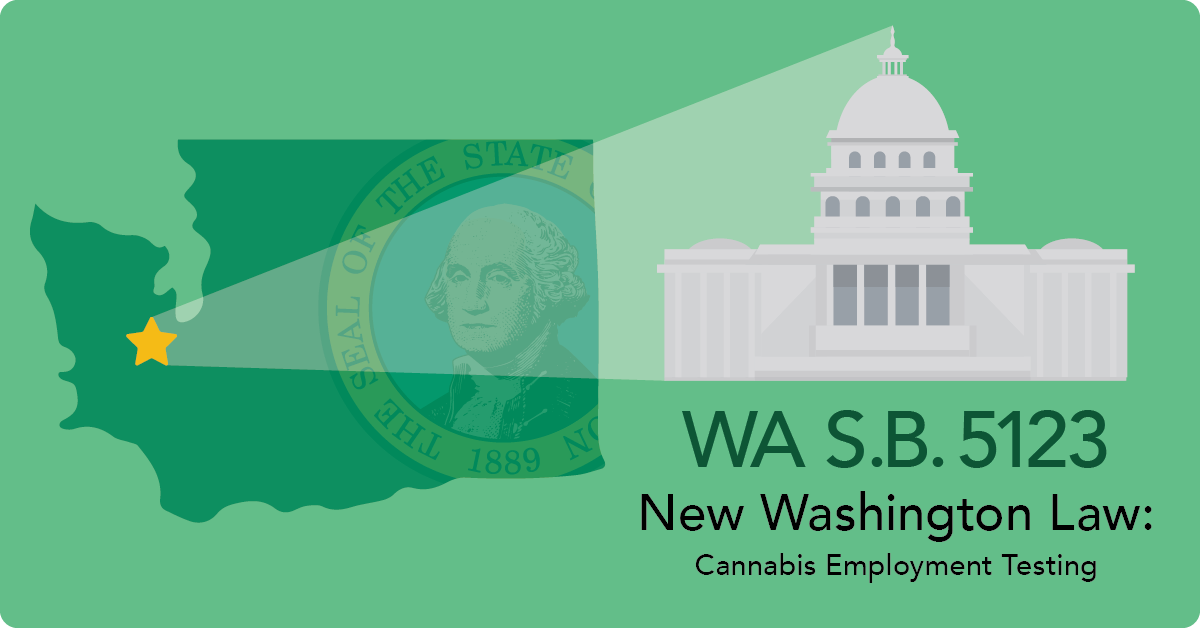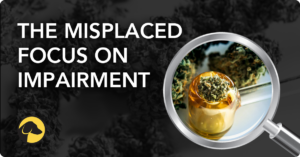
New Law WA S.B. 5123 Will Protect Some Job Applicants From Discrimination Based on Off-Duty Marijuana Use
Employers in Washington will soon be restricted from making hiring decisions based on pre-employment testing for off-the-job cannabis use or test results showing non-psychoactive cannabis metabolites in an applicant’s oral fluid, urine, hair, or other bodily fluids. Washington’s new law, Senate Bill 5123 or WA S.B. 5123, signed by Governor Jay Inslee on May 9, 2023, takes effect on January 1, 2024.
QUICK HITS
- The bill will limit the ability of some Washington employers to make initial hiring decisions based on job applicants’ lawful, off-the-job use of cannabis or test results indicating the presence of non-psychoactive cannabis.
- An employer may base initial hiring decisions on scientifically valid drug screening conducted through methods that do not screen for non-psychoactive cannabis metabolites.
- The law does not preempt state or federal laws requiring an applicant to be tested for controlled substances, and it does not apply to applicants seeking positions requiring a federal background investigation or security clearance, certain public safety positions, or certain safety-sensitive positions previously identified by the employer.
The law notes that recreational cannabis use was legalized in Washington in 2012, and that cannabis tests which “show only the presence of non-psychoactive cannabis metabolites from past cannabis use, including up to 30 days in the past, have no correlation to an applicant’s future job performance.” Likening legal cannabis use to legal alcohol use, the Washington Legislature has removed some restrictions on job opportunities based on an applicant’s past use of cannabis.
Employers can still base hiring decisions on scientifically valid drug testing that screens for other types of controlled substances but not for non-psychoactive cannabis metabolites. An employer can also continue to use drug tests that detect a range of controlled substances, including cannabis, as long as the findings related to past cannabis use are not provided to the employer. Additionally, the law expressly excludes from its coverage other types of controlled-substance testing, “such as post-accident testing or testing because of a suspicion of being under the influence of alcohol, controlled substances, medications, or other substances.” Nothing in the law affects an employer’s right or obligation to maintain a drug and alcohol-free workplace “or any other rights or obligations of [the] employer required by federal law or regulation.” Although not explicitly addressed in the law, employer testing for more proximate marijuana use or psychoactive cannabis metabolites may be valid and more indicative of recent use versus historical use.
Washington’s new law does not apply to job applicants seeking:
- Positions requiring a federal government background investigation or security clearance;
- Certain law enforcement positions or fire department, first responder, and corrections positions;
- Positions in the airline or aerospace industries; or
- Some safety-sensitive positions
The law also “does not preempt state or federal laws requiring an applicant to be tested for controlled substances.” This includes laws requiring testing, or a way that testing is to be performed, “as a condition of employment, receiving federal funding or federal licensing-related benefits, or as required by a federal contract.”
California enacted a similar law last year that will also go into effect on January 1, 2024. With the ongoing passage of state laws legalizing cannabis, additional laws prohibiting pre-employment testing for cannabis are likely to follow across the country. In addition, a growing number of large employers have already enacted policies limiting pre-employment testing for cannabis in states where the drug is legal, citing access to an expanded pool of talent as motivation for such policies.
KEY TAKEAWAYS
Employers in Washington may want to review their drug testing policies to ensure they are in compliance with the new law. Employers must ensure that any pre-employment drug test does not screen for the presence of non-psychoactive cannabis metabolites or, if a test does screen for such substances, the employer does not receive communications regarding the detection of non-psychoactive cannabis metabolites. If employers continue to test employees for the presence of psychoactive cannabis metabolites to detect on-the-job use, they may want to consult their testing facilities/laboratories to ensure the test methodologies relied upon will only screen for the presence of tetrahydrocannabinol (THC) rather than for the presence of non-psychoactive cannabis metabolites.
Employers can also start identifying job postings for positions they consider “safety-sensitive,” where recent use could result in significant injury or death. Updating postings to reflect such a designation will support compliance with the law’s requirement that these positions be identified prior to an applicant’s applying.
Finally, employers may want to ensure their policies indicate that use or being under the influence of marijuana in the workplace or during working hours continues to be prohibited.
Ogletree Deakins and Hound Labs will keep monitoring developments concerning the legislation and continue to post updates.
This article is reprinted with permission from Ogletree Deakins, a labor and employment law firm. This information should not be relied upon as legal advice.
About the Authors

Kathryn P. Fletcher
Kathryn P. Fletcher represents employers in all aspects of employment claims and litigation in federal and state courts, at arbitration, mediation, and before administrative agencies, including matters involving wrongful termination, discrimination, sexual harassment, disability and religious accommodation, retaliation, wage and hour, and breach of contract claims. Kathryn has successfully defended cases before the United States Court of Appeals for the Ninth Circuit and the Washington State Court of Appeals.
Danielle Smith
Danielle Smith joined Ogletree Deakins as an associate in February 2023. Her practice focuses on representing employers in litigation matters in state and federal courts. Danielle has experience with matters involving discrimination, sexual harassment, retaliation, hostile work environment, wage and hour, and disability accommodation. Danielle’s litigation experience includes state and federal jury trials and a record of success on summary judgment and other dispositive motions.


July 27, 2023
By KATHRYN P. FLETCHER + DANIELLE SMITH, Ogletree Deakins
Share












